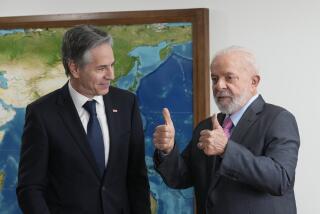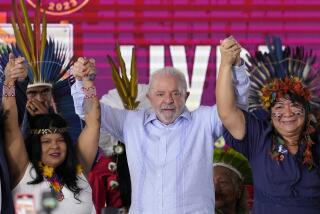3 Latin Nations Urge Castro to Expand Reforms
- Share via
COZUMEL, Mexico — The leaders of Mexico, Venezuela and Colombia pressed Cuban President Fidel Castro here Wednesday to broaden the limited reforms he initiated in Cuba last week and offered to mediate a rapprochement between him and the United States.
A Mexican official said that Castro told the other presidents during three hours of meetings that he recognizes the need for a further relaxation of his one-party Communist system but that he refused to make a public commitment to do so.
The official quoted Castro as telling his colleagues: “I know the magnitude of my problems and know I have to make reforms, but I don’t want to talk about them publicly so as not to confuse my people.”
The summit in this Caribbean resort was part of a Mexican-led effort to bring about change in Cuba through regional pressure rather than by further isolating Castro’s economically crippled regime.
Mexican President Carlos Salinas de Gortari invited Castro to join his meeting with Presidents Carlos Andres Perez of Venezuela and Cesar Gaviria of Colombia. Salinas told reporters that instability in Cuba would “have repercussions in our country and the rest of Latin America.”
The three leaders agreed in a statement “to fight for the rapid and total re-integration of the Cuban nation into the heart of the Latin American family” and to try to mediate between Cuba and “those countries with which it might have differences.” But the communique also said there are “expectations” of change in Cuba “that ought to be encouraged.”
President Bush said last May that the United States is willing to end its 30-year trade embargo against Cuba if Castro, who came to power in 1959, holds internationally supervised elections and frees political prisoners.
Two months later, Latin leaders at a 21-nation Ibero-American summit lobbied Castro on the need for political reform, but he declined to promise any.
Since then, a failed coup in the Soviet Union has deprived Castro of his closest allies in the Kremlin and has jeopardized Cuba’s already dwindling supply of oil and food from its main trading partner.
Responding to the crisis, Castro engineered minor reforms at a Communist Party congress that ended last week. The congress decided to allow direct popular voting for Cuba’s National Assembly, with non-Communists eligible to seek election. It approved a partial privatization of the island’s service sector but decided against letting farmers sell their crops on the open market.
Perez said Wednesday that Cuba’s reforms “are not sufficient to satisfy international opinion.”
Castro, meeting separately with reporters, did not address that point. But he insisted that socialism is “not incompatible with integration into Latin America.” And he saw “very little possibility” of improved relations with Washington.
More to Read
Sign up for Essential California
The most important California stories and recommendations in your inbox every morning.
You may occasionally receive promotional content from the Los Angeles Times.













